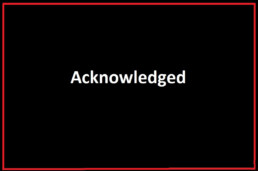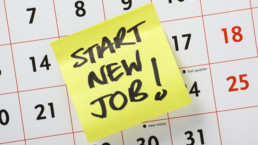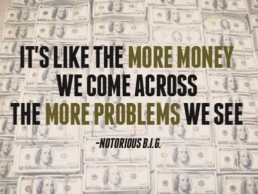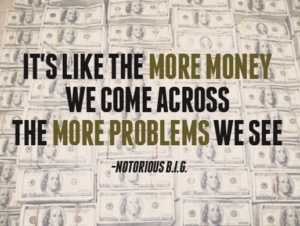Management Changing Your Commission Plan?
Management Changing Your Commission Plan?
by Peter Cotton, founder and president of Best Sales Talent, LLC
The video below originally aired on CBS News online, however the link to the video has expired. I can, however provide the correct attribution to its creator.
Many sales people will find that the content resonates with them. I hope you are not faced with this sort of thing, but if you are, I'd say its time for a change of employer. Enjoy this video from The Maverick Selling Method :
Acknowledged
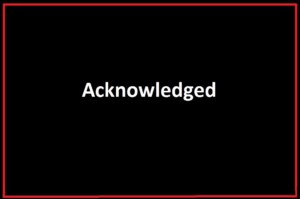
by Peter Cotton, founder and president of Best Sales Talent, LLC
Ever sent an email to someone and not receive a reply? Even a one-word reply?
Most of us have.
Email someone important details they need in order to run their business.
No reply. Not even a simple “Thank you.”
Email a person with something they asked for.
No reply. Not even a simple “Thx.”
Email someone information they need about an upcoming interview.
No reply. Not even a simple “OK.”
There are other scenarios, but you get the picture.
This goes through your mind: Did they receive my message? Is their email even working? I should have received a thank you. What if they didn’t receive it in time – will they think I didn’t do what I had committed to doing? Don’t they care? Aren’t they interested? Is it something I did or said that created some sort of a problem?
In more than four decades as a recruiter, I’ve had more than my share of emails that went unanswered. Then I had the good fortune of working with Jim, the president of a southern industrial manufacturer. He not only answered every email, but he would reply with one-word answer that summed up what I wanted from him (or any other person for that matter) as a response.
Acknowledged.
In my book, it’s better than OK, thx, or thanks. It means the message was both received and understood.
Acknowledged.
If you are the recipient of an email that only requires a simple response, try it. The other person will appreciate it, and you will be perceived as a professional.
21 Ideas for New Hires: Learn These Tips Before the First Day on the Job!
21 Ideas for New Hires:
Learn These Tips Before the First Day on the Job!
By Peter Cotton, founder and president, Best Sales Talent, LLC
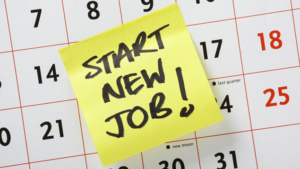
Congratulations. All the hard work in your job search is done. No more interviews. You are starting a new job!
The real hard work, though, is about to begin. Your elation may slightly diminish when you realize all that you must learn and become familiar with – in fact it can be downright overwhelming.
Whenever a person starts a new job, the people they work with gain a lasting impression of him/her based on what the person does (or doesn’t do), says or asks (or doesn’t say or ask) during the first 90 to 100 days (also known as the honeymoon period). Some companies call the first 90 days to six months a probationary period. Regardless of what this time period is called, new employees are under a figurative "microscope."
I've listed 21 ideas that will help new hires. I'm fairly confident that most of these ideas will apply to anyone regardless of industry.
How To Position Yourself as a Smart and Savvy New Hire
1. Always pay attention to everything you hear, and write it all down, especially people's names. New co-workers and your manager will tell you a lot of new information, and you will look like you want to remember and learn.
2. Always arrive early. Being late is never acceptable. Being precisely on time is not ideal. Set your watch five minutes fast. Allow extra time to commute and get there early.
3. Always take less than the hour (or half hour) for lunch if you can. Bring your lunch, which will save you time and money. If you're invited out to lunch, pay your own share, including tax and tip. Get back to work as quickly as possible. It shows your desire and commitment early on.
4. Always leave AFTER the time you can leave. Clock watchers who are getting ready to leave at 4:30 or 4:45 PM, before the work day is over, are not looked upon as team players.
5. Observe what people wear to work – especially people in your department. Dress similarly.
6. NEVER use the office computer to do personal work – that includes bill paying, Facebook, Twitter, Instant Messenger, LinkedIn or other social media, or checking personal email. Don’t do it on your phone either. Your co-workers will notice, and you can bet they will tell their other co-workers. It won’t be long until your boss knows, and you'll earn an immediate and likely long-lasting reputation that you're not serious about working there.
7. If your LinkedIn profile is checked that you are OPEN TO CAREER OPPORTUNITIES – turn that off. Immediately! Before you start. Some employers get very nervous if they check the profile of a new hire and see that you are “still looking.”
8. NO outbound texting or personal calls during the work day (other than lunch time). Notify your friends and family not to call you, text you, or email you during the business day – if they stop, you won’t be tempted to check to see if they left you a voicemail, text or email. Tell your family to call you only if it is an emergency. Anything else can wait for a call during lunch or after work.
9. Turn off the ringer on your personal cell phone. Put it on vibrate. One of the things most annoying to employers and co-workers is to hear the new guy’s cell phone constantly going off on every text, email, and call.
10. Get familiar with your surroundings, so that you'll be comfortable at your new office. Locate the copy/fax machine, office supplies, and the bathroom.
How to Get a Grip on Everything You Need to Know to Do Your Job Successfully
11. When in doubt, ASK. Don’t guess or assume. Better to verify before than be sorry after.
12. Set up a meeting with your new boss. You will want to hear your boss tell you again about your job. Sometimes things change since your first interview. You’ll want to know:
a. responsibilities
b. performance expectations
c. standards (indicators to help you know what your goals are)
d. who your primary contact points are and why
e. events, like status report due dates and department meetings
Your new boss may not tell you all these things, as that may be delegated to other people as part of your training, but you need to know this information soon and often until you have it memorized.
13. Set up a meeting with all the key players. This should include the admin or secretary that supports your boss. This person/people will know everything and everyone. Creating a close relationship with this person/people will be helpful. You will want to understand what function each person performs and how your role interacts with them. You need to make sure that you find out any details about how your work needs to be done to set yourself and them up for success.
14. Drill down on your job. Familiarize yourself with the computer you will be given. Learn all the software if you have not used it previously. There will be different forms of reports and paperwork that you will need as part of your job. Accumulate everything that anyone thinks is part of your job and study what you have. Create a “sample” copy of all typical reports and spreadsheets. Familiarize yourself with each element and track the origins of things, so you will know where or how they are produced. Pull out previously completed work and study what has been produced before you arrived. As you do this, it will help you develop questions that you can ask of others.
How To Become Part of the Company Culture
15. Observe. As with any group of people, there are politics and culture to consider. Before you step on a metaphorical land mine, you want to come in as an observer to the organization. You need to understand the informal leadership, the influencers and problems. All new people are automatically given a state of grace for their ignorance during that period. Make sure to ask plenty of questions and be watchful. It will be your knowledge of the culture, your personality, and how you do your job that will set the bar for how well you integrate. Integration into the culture may be a strong indicator of your future success and career growth.
16. Be open to change and criticism. Don’t be hard on yourself. Everything will become familiar soon.
17. NEVER say, “At (your former employing company name), we did it this way,” if it implies that the way your new company does things is wrong. If you know a better way to accomplish something, state it as your own idea, as in, “may I suggest a possible alternative method to achieve the goal/objective/outcome?”
18. Ask for feedback. Ask for it early and often. As you are starting to produce work, seek out your boss or other key players for their feedback on your work. Just like integration into the group, your work also has a grace period. You want to use your grace period as a window to learn by doing and adjusting until you are producing at or above the expectations. You won’t know unless you ask.
19. Obtain and mentally DEVOUR every piece of product literature the company has. Memorize what is on their website.
Final Words of Advice
20. Have fun. You don’t want to establish yourself as the class clown, but you want to enjoy your new job. Lighten up on yourself, laugh at your mistakes, and tackle the hard stuff with a great attitude.
21. And finally, strive for your best performance in everything you do. Remember, success comes to those who work for it, not those who wait for it to happen to them.
I hope the above list is helpful. Do you have any more ideas to add? If so, I'd love to hear them. Shoot me an email or give me a call at (401) 737-3200.
Ewww...That’s Waaaay Too Much!!
Ewww...That’s Waaaay Too Much!!
By Peter Cotton, founder and president, Best Sales Talent, LLC

I'm just going to come right out and discuss the figurative elephant in the room that no one usually wants to bring up in an office setting: an employee who uses an enormously strong or overbearing amount of cologne, aftershave, perfume, or deodorant.
You can be several feet from them in the hallway - or worse - standing inches away from them in an elevator or right next to them at a meeting, and all you can think about is: "ewww that’s waaaay too much!”
When you think about it, a man in your office could be wearing up to FOUR different scented products at one time: hair product, after shave or cologne, deodorant, and body spray. When these smells mix, it can be just as obnoxious as smoke is to a non-smoker.
Just as you know to dress appropriately conservative for the office, you need to smell neutral as well.
There isn't anything much worse than not being able to concentrate on your job or getting physically sick from a scent that you simply cannot escape from because you must work with the smell's source every workday!
According Chron.com "A perfume that one employee may find delightful can be downright offensive to someone else, causing allergic reactions, headaches and even nausea that make it tough to get work done --and -- perfumes can cause sniffling, dizziness, headaches, nausea and breathing problems for other workers. Some reactions, like shortness of breath, are particularly severe for people with preexisting respiratory conditions, such as asthma and chronic obstructive pulmonary disease."
I'm not sure if you are aware, but there has even been a scent-related court case. In McBride v. the City of Detroit, "it was ruled that senior city manager Susan McBride’s chemical sensitivity was a disability under ADA because it interfered with the major life activity of breathing."
"After the lawsuit with Susan McBride, the City of Detroit added the following section to its ADA Handbook:
“Our goal is to be sensitive to employees with perfume and chemical sensitivities. Employees who are sensitive to perfumes and chemicals may suffer potentially serious health consequences. In order to accommodate employees who are medically sensitive to the chemicals in scented products, the City of Detroit requests that you refrain from wearing scented products, including but not limited to colognes, after-shave lotions, perfumes, deodorants, body/face lotions, hair sprays or similar products. The city of Detroit also asks you to refrain the use of scented candles, perfume samples from magazines, spray or solid air fresheners, room deodorizers, plug-in wall air fresheners, cleaning compounds or similar products. Our employees with medical chemical sensitivities thank you for your cooperation.”
Here is another proof point that everyone needs to keep strong smells out of the office: ToughNickel.com cited 31 percent (nearly 1 out of 3) of the general population is irritated by the scented products that other people wear. And 19 percent experience negative health effects from air fresheners.
If I haven't convinced you yet, below are some of my own personal experiences to back up the "neutral smells only" argument:
- A candidate came in for an interview, but even before I met him, when my administrative assistant came in to hand me his resume, it smelled strongly of after shave. When I went out to greet him, we shook hands. I immediately noticed he was nervous. His hands were sweaty. On top of that, the amount of after shave, or cologne he was wearing was overbearing. The scent of his after shave was in my office for a good hour after he left. I had to wash my hands repeatedly to get rid of the smell. I can only imagine that since the interview was late in the afternoon, he had a bottle of after shave in the car, and he splashed it on his hands and then onto his face before meeting me, as if doing so was going to make him a more “attractive” candidate. To say it was a real turn off would be an understatement!
- I sent a candidate to a client for an interview. He must have put on an excessive amount of aftershave that day. The client called me and said the candidate was eminently qualified, and he would like to hire him, but he can’t. His reason? The candidate smelled like a “stinking #@&*!” He said that as part of the training, he would have to ride with the new hire to meet some customers. He told me there was no way he would be able to stand riding in car, a confined space, with this person -- not to mention being embarrassed to introduce him to customers.
- A new employee wore a brand of perfume on her first day to work. The perfume happened to be the same brand that her boss’s former wife wore. Every time the boss was in proximity to the new hire, the scent conjured up his nasty divorce. He couldn’t stand it and began to dislike the woman he hired. Their relationship went downhill from there.
- I have a client who has a fragrance-free manufacturing facility. A sign is posted at the front door indicating that no fragrances are allowed into the building. They not only don’t allow people inside with after shave, cologne or perfume, but also ban people with scented deodorants, and shower products that have a scent. The owner told me that he has seen sales people come to the front door, read the sign and leave, never to return. Those sales people lost the opportunity to do business with the owner. Visitors were turned away as well. Seems that some of the employees have the same sensitivity as Susan McBride in the court case mentioned above.
Just something to keep in mind when creating an office dress code or being in the office yourself: keep your smells completely neutral. Save strong scents only for outside the office -- that is if your friends and family can stand it!
I hope the above article helps you in some way. Do you have any more thoughts to add? If so, I'd love to hear them. Shoot me an email or give me a call at (401) 737-3200.
The "Holiday Slump" Could Actually Be Your Best Opportunity for Finding a Job or Placing a Candidate
The "Holiday Slump"
It Could Actually Be Your Best Opportunity for Finding a Job or Placing a Candidate
by Peter Cotton, founder and president of Best Sales Talent, LLC

Here we are again...if I can quote an old refrain, "it's beginning to look a lot like Christmas..."
Whether you celebrate Christmas or not, it always feels like everyone's mindset about being productive drastically declines sometimes as early as the day after Halloween - or definitely before Thanksgiving. People use "the holidays" -- in theory, just two days for Thanksgiving, one for Christmas and one for New Year's Day -- as their biggest excuse as to why they aren't hiring or job searching.
While some people take vacation during the "slow holiday time," everyone else is just putting things off until after January 1st. Things are slow during this time because of the "holiday" mindset.
Bear with me for a quick moment though...I have always thought, like generals, a good time to attack is when the enemy is sleeping. So, when the majority of job-seekers are slowing down or stopping their search until after ”the holidays,” some smart people are accelerating their search: making more calls to hiring managers, sending more resumes to hiring managers, getting in front of hiring managers face-to-face (note I didn’t say apply online or send a resume to HR as they are probably taking time off or slowing down, too).
You may find this article on The Balance Careers as proof as to why the holidays is the ideal time to job search. Additionally, Forbes.com has a list on smart ways to job search during the holidays as well as a one related to millennials.
These smart people are finding less competition – and likewise, employers would find less competition for finding top talent. When companies put things off until after the 1st, they are causing the November through December slowdown in business. Then after the 1st of the year comes, they start anew to find top talent . However, most top talent already is gone by then, or it will take them all of January through March to search, recruit, interview, hire, and onboard new people. This only ensures another period of not doing the most essential thing: make money for their companies.
Rivs.com and iHire.com are just a couple of sites that agree that the holiday timeframe is a great opportunity for recruiters also.
Many recruiters lament that the end of the year is slow for placement activity. I disproved it two years in a row by having my best 4th quarters by having a lot in the pipeline that closed as placements in late November through the end of December. I also had two December search assignments that were under 30 days from the time of getting the search to placing the candidates.
By the way, you may find this article on LinkedIn about recruiting lessons from holidays movies a fun read.
I hope the above blog post encourages you to use the holiday time as an opportunity and an ideal time to ramp up your productivity in finding a job or the right candidate. Do you have any more thoughts to add? If so, I'd love to hear them. Shoot me an email or give me a call at (401) 737-3200.
How to Look Your Best in a Video Conference Interview
How to Look Your Best in a Video Conference Interview
by Peter Cotton, founder and president of Best Sales Talent, LLC

Image from skype.com
Did you know that thirty years ago, a video conferencing room and equipment cost $100,000, and there were very expensive per minute charges to send the video and audio signals over multiple phone lines to another site of similar equipment?
Those costs alone made video interviews quite rare.
However, fortunately for us in the recruitment industry, technology has a way of improving rapidly, and the costs decreased dramatically for video gear. In 1990, Management Recruiters International (now known as MRINetwork) launched their own videoconferencing network called ConferView Video Conferencing Centers and 135 MRI offices across the United States installed it.
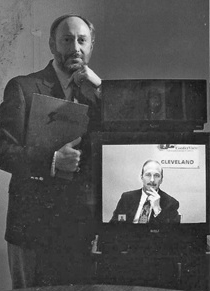
As a franchisee of that organization, I purchased a CLI Eclipse Video Conferencing Unit for about $16,000. I owned the first public videoconferencing site in Rhode Island in 1990. Using ISDN phone lines, at about $0.53 per minute to make a call to another ConferView site, collectively we were able to save employers millions of dollars.
Seen above, as it appeared in local newspapers, I am in my office (MRI-Sales Consultants of RI), in Warwick, RI having a video conference with our corporate office in Cleveland in 1990.
MRI, who placed 40,000 candidates a year, realized that out of the 90,000 interviews their offices created in their network annually, about 25 percent of them required either an employer or a candidate to get on a plane to meet the other for an interview. At an average cost of $1,200 per interview for flight, car rental hotel and meals, those in-person, fly-in interviews cost all those employers collectively about $27,000,000 a year.
Instead of flying three candidates in for an in-person meeting (at an average cost of $3,600), an employer could conduct an interview using ConferView for $250 for a 30-minute interview and $350 for a one-hour interview, depending on how much time he took. Candidates didn’t need to take a day or two out of work to fly-in for an interview. The employer could interview a candidate in New York at 9 AM, in Chicago at 10 AM, and in San Francisco at 11 AM and never even have to leave the ConferView site.
At my ConferView location, I set up my conference room with color-balanced lights placed high in front of, behind, and on both sides of the candidate or employer facing the camera and monitor. The candidate sat in front of a plain background. I did this to showcase that the candidates who came to my office would be seen in the best possible “light.”
Fast forward to the present day. That $16,000 CLI Eclipse Video Conferencing Unit became a very expensive boat anchor.
Now video conferencing interviews are virtually free, so long as a laptop is equipped with a webcam, or a person invests about $70 for a decent webcam for their PC. Free video conference programs, such as Skype or Zoom, are easy to use and provide very good quality audio and video.
For more than 15 years now, I’ve had countless video conversations with employers and candidates using Skype for their interviewing needs. This means I have seen plenty of good and bad video interviews.
Here are some tips on how to ensure you have the best possible and successful video interview.
Technology Advice
-- Test your camera video and audio before the interview. Make sure everything works properly and that you know how to use the video program.
-- Use Skype's own free testing service or test by calling a friend and have them call you.
-- Turn your cell phone off or place it on vibrate and away from where you are sitting
How to Position Yourself in the Best Light
-- It is best for you to practice how to look directly into the camera lens, because it will give the employer the impression that you are looking into his or her eyes. Eye contact is critical, since you aren't speaking to the hiring manager in person. At the very least, look at the monitor and the other participant.
-- Try to get into the habit of hesitating slightly before speaking to assure that the other person has finished speaking.
-- Speak in a normal tone of voice. There is no need to speak loudly.
-- Consider your body language. Don’t lean forward too much, trying to get your face near the screen. Instead, slightly lean forward, smile, and look alert and interested.
-- Avoid taping pencils, rustling papers, and distracting noises that may be magnified by the audio system on the other end.
-- Consider wearing pastel-colored shirts and ties that don't have overly busy patterns.
-- Avoid horizontal stripes.
-- Don't wear glittery jewelry that will catch the light and be distracting, or dangling jewelry that clinks on the table, because it sounds very loud.
-- Avoid excessive motion. Rocking in your chair or dramatic hand gestures will appear as a blur to the other person. Don't be unnaturally stiff either. Relax just as you would if you were speaking with someone in person. Eventually, you will feel as if they are right there in the room with you anyway.
How to Position the Video Conference Space in the Best Light
-- Don’t sit above the camera. If the webcam is shooting up towards your chin, that will be a very unflattering angle. Position yourself so the camera is looking straight at you. If necessary, prop your laptop on top of something so the camera is at the same angle as your face.
-- Plain, uncluttered backgrounds are best. You want the person to be focused only on your face.
-- Choose a quiet spot that is away from the noise of traffic, kids or pets.
-- Avoid having the interview in a public place where there are background distractions or noise.
-- If there is a window where you will be having the interview, position yourself so the window light is directly on your face, and the back of the camera is facing the window. Never sit with your back to the window and then aim the camera at your face. You will be in silhouette.
-- Try not to have lights on over your head. It will cast ugly shadows under your eyes and nose.
-- Also, avoid fluorescent lights, which will cast a greenish hue on video.
-- When possible, have lights or lamps located at your side. Do not aim strong lights at your face as it will wash you out on video. Incandescent lights, rather than LEDs, will give a warm tone to colors.
Follow those steps, and you’ll appear and sound your best during a video conference interview. Do you have any other tips about videoconferencing interviews? If so, I welcome your ideas. Shoot me an email or give me a call at (401) 737-3200.
Hiring Manager's Quick Guide to Becoming More Empathetic Toward Candidates
Hiring Manager's Quick Guide to Becoming More Empathetic Toward Candidates
By Peter Cotton, founder and president, Best Sales Talent, LLC

Image from Nordstroms.com
Almost everyone has heard these old expressions: “to understand a man, you have to walk a mile in his shoes” and "treat others as you want to be treated."
Seeing the world from another person's perspective seems to be somewhat of a "lost art.” Too many hiring managers have forgotten how to treat candidates whom they have interviewed for open positions at their organizations. Additionally, they lack a great deal of empathy. If they looked at the interviewing process from the candidate’s point of view, they could learn a great deal about how to improve the candidate's experience. If they learned how to interview properly, and to ultimately make a good hiring decision, they also could do it in a way that will enhance the company brand and the reputation of the hiring manager. My opinion on this can be found at: Poor Hiring Practices Spell Negative PR for Companies.
Hiring managers should take note of a recent article I wrote: Attention Candidates: When Hiring Managers Go Dark, Turn on the Light! It describes what goes through a candidate’s mind before and after an interview. Basically, when the hiring manager goes dark, the candidate’s initial positive outlook on the job, company, and manager becomes one of disappointment, distaste, and contempt.
As a recruiter, I find it is becoming more common for hiring managers to not do what they say they will do. Phone calls and emails aren’t returned. Promised deadlines come and go with no decisions. Candidates don’t get feedback on their interviews and don’t know where they stand. Sometimes a "no decision" becomes the final step, and the candidate feels like they fell into a deep, dark hole. When a recruiter is involved, they can “run interference” somewhat for the candidate, but even they are left in the dark at times. Although it is shameful to say, there are even some recruiters who leave candidates in the dark.
As a recruiter, I think of myself not so much in the personnel placement business as I am in the communication business. I facilitate communication between candidates and hiring managers. As a conductor leads a symphony orchestra, I initiate and lead a process that can result in a hire.
When a recruiter like me gets no feedback from a manager or hears about an employer who went dark on a candidate who interviewed on his own -- without a recruiter’s help -- several thoughts go through my mind. There are ways an employer could enhance the candidate experience, and in so doing, enhance his reputation and the reputation of his organization.
Please see below for my quick guide on how employers can be more empathetic toward candidates:
-- Write a clear job description.
-- A list of “must haves” is not as effective as a list of “can dos".
-- Know what you want before starting a search.
-- “I’ll know it when I see it” is not going to work. Those kinds of hires are doomed for failure.
-- Create an easy application process with short, clear instructions. Make it mobile accessible.
-- Send an email confirmation that their application was received and explain what will happen next.
-- Give directions to candidates so he/she knows where to go and where to park. If parking requires a pass, explain how he/she can get one.
-- Tell the candidate what building and what door to enter and where to go once inside.
-- Alert the candidate in advance as to how much time he/she can anticipate spending on an interview and who else the candidate will meet.
-- Respect the candidate’s time. Don’t leave them sitting in the lobby more than five minutes. Don’t take calls when the candidate is sitting at your desk. Don’t allow your employees to disturb the interview. Turn your cell phone ringer off.
-- Improve your interviewing skills.
-- Make sure your interview questions are the same for all candidates.
-- Tell the candidate what to expect once the interview is over. If no decision is to be made on the spot about a second interview, tell the candidate when he/she will hear back. Specify a date and live by it!
-- Give feedback at the time of the interview and ask the candidate for feedback, too.
-- Give the candidate your business card with your email address and phone number. Encourage the candidate to contact you if he/she has any questions.
-- Treat candidates as you would a customer. In fact, one day they may become a customer, or be able to recommend a purchase of your products. Leave them feeling good about you, your company, products and/or services
-- Send the candidate a thank you note for coming to discuss the position. This will give you and your company great PR as it's rare for a hiring manager to do it.
-- Move the process along quickly and efficiently. Don’t drag your feet.
-- If you are unable to decide on the day and time promised, call the candidate. Let him/her know that he/she is still in the running, and that although you have no decision on him/her now, you will by a new date and time. Live by the new date!
-- Always acknowledge any email coming from the candidate. Their biggest pet peeve is sending an email that goes into a black hole.
-- If the candidate calls after the interview and leaves a voicemail, return it promptly. Again, this will garner great PR for you and your organization’s brand.
-- Unqualified candidates should be told early on that they won’t be continuing in the process. Don’t create false hope. (Some hiring managers will interview many candidates, hire one, and only then do they tell those who weren’t moving along in the process that they were not chosen – sometimes months later.)
-- DO NOT LEAVE CANDIDATES IN THE DARK. EVER!
Here is a quick story about a hiring manager who did it right. I worked with client who was the VP of Sales. I introduced a candidate for a National Sales Manager role. The employer did everything I mentioned above, and he hired my candidate. His process for on-boarding the candidate was outstanding. When the candidate started work on a Monday, he was given an agenda for the week listing what he would be doing or learning and who he would be meeting on an hour-by-hour basis. The manager arranged to have lunch with him the first day and had different people within the company from various departments meet him for lunch for each of the remaining days of the week.
That wasn't all though! On Friday of his first week at the new job, the VP of Sales did something special for the new hire. He located a nice French restaurant not far from the candidate’s home. He gave his American Express card number to the maître de. He told the candidate that the company was so pleased to have the candidate join their team that he wanted to show his appreciation. He told the candidate to take his wife to the restaurant on the next night (Saturday) and that they should order anything they wished. He also arranged for the maître de to bring a nice bottle of wine to the table that evening. The candidate’s wife was duly impressed, and the candidate had very positive feelings about his new boss and the company from that day forward.
If you are a hiring manager, I hope you found my above guidance worthwhile. Do you have any other steps in your interview process that gives the candidates a positive experience? If so, I welcome your ideas. Shoot me an email or give me a call at (401) 737-3200.
Attention Candidates: When Hiring Managers Go Dark, Turn on the Light!
Attention Candidates: When Hiring Managers Go Dark, Turn on the Light!
By Peter Cotton, founder and president, Best Sales Talent, LLC
I previously wrote a blog post about how hiring managers sabotage themselves and their companies when interviewing candidates. I explained how treating candidates poorly during (and after) their interview can generate some seriously negative public relations for a company. It can destroy the reputation and brand of the company as well as the hiring manager. You can read that post here.
According to a CareerBuilder study three years ago, “82 percent of employers think there’s little to no negative impact on the company when a candidate has a bad experience during the hiring process. The reality, however, is that the majority of candidates do not take poor treatment lying down: 58 percent are less likely to buy from a company to which they’ve applied if they don’t get a response to their application; 69 percent are less likely if they have a bad experience in the interview; and the same is true of 65 percent if they didn’t hear back after an interview.”
As a recruiter with more than 41 years of experience, I’ve spoken to thousands of candidates. Most of them are frustrated by the interviewing process. What I hear and see happening many times is that employers keep candidates in the dark about (a) feedback after their interview -- will they be going further in the process; (b) when and what the next step will be; and (c) if they are done with the interview process, when is an offer coming?
Allow me to give you a glimpse into the mind of a typical candidate who is going through an interview process and who ultimately gets left in the dark by an employer. It usually goes something like this:
Before The Interview
- -- I’m really looking forward to this interview. I’ve done a lot of research, and I am prepared.
- -- I’m going to do a dry run to see how long it will take me to get to the interview next week. I’m going to check out where to park.
- -- Their building looks nice. I wonder if the inside is as modern.
- -- Tomorrow is my interview. I’m so excited that I cannot sleep.
- -- I’m leaving early. I don’t know what the traffic will be like. I’m glad I did a dry run.
- -- I had to park a long way from the building. All the guest parking was full.
- -- I am imagining what it will be like working here while walking in the building.
- -- The receptionist is nice, and everyone walking around here smiles at me. I'm sure that I would like working here.
Right After The Interview
- -- I think that interview was my best yet! I was very well prepared for the interview. I answered all the questions with confidence and showed
- my experience! I'm so interested in working for this company. It's my dream job! I think I convinced the hiring manager that I am the person
- for the job!
- -- He was really a great guy. I could see myself working for him, and the job sounds great.
- -- I sent a thank you note emphasizing how much I want to work there.
- -- Maybe I don't have to search for a job anymore! Wouldn't that be something?!
- -- I'm so excited. I wonder when I'll be called back for the next step?
Days Later
- -- It's been a few days now. I wonder when I will hear from them.
- -- I had my interview with the company last week, and I still haven't heard anything. There must be a valid reason. Maybe the manager is busy.
- -- I want to be proactive and show how much I want the job, but I also don't want to be annoying to the hiring manager and follow up
- too soon or too often.
- -- Let me talk to my recruiter (if I have one) or a friend or family member who is my job-hunting mentor and see what they think I should do.
- -- Everyone agrees I should send the hiring manager an email to see what the next step will be.
- -- I haven’t heard back from my email. It’s been three days. How hard would it be for him to send me a reply, so I know what is going on?
- -- I'm going to call the hiring manager tomorrow to find out what is going on.
- -- I got his voicemail, so I left him a message. He hasn't called back yet.
- -- I wonder if he thinks I sounded desperate.
Weeks Later
- -- It’s been more than two weeks now. He said I would hear back from him.
- -- I called and left another voicemail message, but he didn’t call back. I’m guessing that I won’t be going back for the next step.
- Still, it’s rude he hasn’t given me any feedback or let me know where I stand.
- -- I'm having real doubts about this company. Maybe it's not such a great place to work after all.
- -- Maybe this manager is not the kind of person I want to work for. If I report to him, and I need an answer on something, can I expect being kept
- in the dark like this?
- -- I think I should start looking at the company's competitors or some other type of company altogether.
- -- My interview and subsequent thank you notes, follow ups and voicemails ended up in a black hole. I'm moving on.
- -- I had told everyone that I was having an interview with this company but now….
- -- This company is bad news and so is the manager. Wait until I tell my [family, friends, neighbors, colleagues] about what happened.
- -- If I ever find myself in a position to recommend or buy their products, I definitely won’t.
Now, you might have had similar thoughts yourself, or maybe you were lucky enough never to be left in the dark by a hiring manager, but either way, it's important to know what to do if you should ever find yourself in that situation. I believe that the hiring manager should give you feedback at the time of the interview, and that if you were not disqualified, then he should communicate via phone or email as to the next step very soon after the meeting. If you haven't heard anything after a week, you should professionally and respectfully follow up with him/her.
Every situation and every company is different, but here are five general guidelines that typically improve the "go dark" situation before it happens and "help turn on the light" in terms of getting the hiring manager to decide to hire you or someone else and finally, what to do if the employer goes completely dark on you:
* Be clear about your own timetable during the interview. Say that you're interviewing elsewhere, but that you really want to work at his/her company. Ask if you can have a decision on moving to the next step in the interview process right there on the spot, or at least within ten days.
* Be direct during the interview. Before you leave, ask for the job after highlighting why you are qualified.
* Send a thank you note (after your recruiter edits it) right after you leave the interview. In the note, focus on explaining why you feel you would be an excellent choice by citing how you have done similar work successfully in the past and that you are confident you would be a successful employee working for him in the future.
* If you haven't heard anything after ten days to two weeks, or in the time frame the hiring manager told you during the interview, check in with the hiring manager via email. In your email, offer a solution to his/her company issue, research a trend in the news that pertains to the company, and/or share another reference of yours. Basically, add something of substance to the follow up, so you show that you’re tuned into the company and its hot button issues.
* Be prepared to walk away from the opportunity if you still haven't heard back from the employer. They are showing that they just don’t have much interest in you. Of course, there could be extenuating circumstances, but if a company moves that slowly, you may not want to work there after all.
I hope you found my above guidance worthwhile. Do you have any other experiences, words of advice/lessons learned about employers "going dark" on candidates? If so, I welcome your ideas. Shoot me an email or give me a call at (401) 737-3200.
Breaking News: Company Gets Outed for Using Multiple Recruiters; Company's Former Positive Reputation is Destroyed
Breaking News: Company Gets Outed for Using Multiple Recruiters;
Company's Former Positive Reputation is Destroyed
By Peter Cotton, founder and president, Best Sales Talent, LLC
The above quote, superimposed over stacks of $100 bills, may be something you have seen or even experienced. Or, you may in the future.
But, I get why...I really do.
Let's say you're a hiring manager at a client company - when you hear about a recruiter that can help you, you may think - hmm...if I have multiple recruiters working to find the best candidate for me, then I can increase my chances of landing the dream candidate. Maybe I can even get him/her placed in the position faster.
Segue for just a second as I try to be "hip" here, by inserting American Rapper Christopher George Latore Wallace's (The Notorious B.I.G.) famous lyrics: "It's like the more money we come across, the more problems we see."
In a way, that lyric hits the nail on the head when it comes to the recruitment industry: if you assign more than one recruiter on to your candidate search, you essentially have a lot more problems!
Let me explain why you should only use ONE recruiter - be in a monogamous relationship with just one - so your company's fate isn't the same as this blog post's headline.
First, "more money, more problems" is 100 percent true. You will waste more of your valuable time (which equates to money) with all the administrative costs of managing more than one recruiter who may/may not be making the candidate search a priority. Why would you agree to that scenario? You have enough time sinks and costs with your current open job position as it is. Most employers don’t think of “soft dollar costs” when filling a position – cost of the hiring authority not doing his/her own job, assigning work to others to pick up the slack for the open slot, secretarial costs of time spent screening candidates, etc.
You may have more recruiters, but overall, they will do less work for you. Recruiters aren't going to spend much time on something if they know they have a 1 in 4 chance of being the firm to make the placement. They’d rather spend their time on an exclusive search, where the employer sees them as a valued partner in filling the job, not as just another firm to perform a transaction. Also, the hiring company looks foolish if candidates are contacted by multiple recruiters for the same position. Those employers are perceived by candidates as being disorganized and desperate. No one involved wants work for a “fool” or to waste their time.
Knowing they are one of many recruiters on a search, each recruiter will do less work for the employer and will focus on speeding through the recruitment process and skimp on evaluating candidates. Recruiting firms will want to rush to submit candidates in the hopes that they are first to present the person. Little to no “quality control” and vetting on the candidates by the recruiter means that will be shifted to the employer. More time expended by the hiring authority. How would you like a resume from a candidate that the recruiter hasn't even spoken to first? Sounds like a recipe for a waste of time to me.
The best candidates will be offered only to loyal clients who are using only one recruiter. They will keep those top candidates exclusive to the employer until he/she decides to hire the person or let them go from further consideration. If you aren't in an exclusive relationship with a recruiter, he/she may offer up the best candidate to other clients. I'm sure you want the best impact players, not a second-rate or third-rate candidate.
One more thing, however...the only moral and legal approach to having a team of recruiters work for you is if your single recruiter that you hired is a member of a recruitment network where he/she shares the position with his/her colleagues and can obtain candidates from the databases and contacts from other offices within the network. Individual recruiters in a network will share in the fee with the recruiters in other offices if they work together on a placement. By working together as a team, they increase the odds of finding the best talent. You will still have a single point of contact with one recruiter. Not several of them vying for your attention.
Now that you understand why you should only use one recruiter, take my two cents worth! Find one like me who has placed hundreds of candidates (see some of them here) and who has many happy, satisfied clients, too (see some of them here). Also, select a recruiter who agrees to the code of conduct when working with candidates and client companies.
By the way, I plan to revisit this topic again in the future, but next time, it will be why a candidate should only use one recruiter.
I hope the above list gives you all the valid reasons why not to hire more than one recruiter to fill an open position. Do you have any more reasons/anecdotes, or do you disagree with any of the above points? If so, I'd love to discuss it with you. Shoot me an email or give me a call at (401) 737-3200.
Love and Marriage: How to "Propose" to an Employer So You Get the Job
Love and Marriage:
How to "Propose" to an Employer So You Get the Job
By Peter Cotton, founder and president, Best Sales Talent, LLC
The following post is about asking for the job. No misogynistic, sexist, chauvinistic, prejudicial, stereotyping, or discriminatory sentiments against women is expressed, intended or implied.
Here is a secret for all the current and future job candidates out there: employers like to be wanted. They want to hear that the job they seek to fill is an attractive opportunity. They want to feel that they are liked and respected, and that you want to work with them and for them. They want to believe that they are good leaders and managers.
Additionally, employers are very fond of candidates asking for the job – especially people in sales. If a salesperson doesn’t ask for the job, the employer might assume that they might not ask for the order when completing an important presentation to a prospective customer.
Remember, hiring is a “marriage” between an employer and a candidate. If they aren’t in love, it doesn’t happen, and if one person doesn’t ask the other for their “hand in employment” then the marriage never happens. It’s a sad day when the interviewing process is completed, the candidate is at the alter ready to say, “I do,” and the employer is out in front of the church looking for a date. Of course, the reverse of that is also true, but that’s for another article.
So, continuing with my love analogy, when your interview with the hiring manager ends, he/she may say something along the lines of, “thank you for coming to meet with us. You are a strong candidate, but we do have other candidates to consider. We will get back to you with our decision within the week.” Basically, what he/she says at the end either means:
A). There are other candidates to interview, and he/she won’t make any decisions until afterwards.
Or...
B). He/she has no interest in you at all.
As you very well know by now, when going after a job opening, there is always another candidate that could be offered the position. Every interview is a competitive situation.
Therefore, here is some important advice on what to say in response: “I understand you may have others to see. May I summarize our meeting today?” [He/she will agree]. As I see it, (fill in the name of the company here) needs a person to (list the things you learned that the person must do). You need the business to (repeat the goals and objectives that were discussed). I am confident I can do the job and accomplish the objectives we have discussed, but tell me, is there anything about my background, experience or education that would preclude you from hiring me?”
Then, you need to listen intently to what he/she says.
If, in response to your question he/she says, “no, there is nothing” then you should immediately say, “Then I want you to know that I would consider it an honor to work for you and (fill in the name of the company here). I would very much like to have the job. I am in a position to accept an offer, if you are in a position to extend one!”
However, if it's something like, “I wish you had more of this or that...,” you need to get back to selling mode and convince him that you are a quick learner, can learn what is necessary, and that you are willing to work as hard as possible to make up for that shortfall.
Following this, say: “From what I can see and what I have learned, this position will utilize all my strengths and skills and will be a welcomed challenge. I am confident I can do the job and would like to have the job. What is the next step? Where do we go from here?”
He/she will likely say there still are other candidates to interview. Then, you can say, “Yes, I know, but I am ready to commit to you, if you are ready to commit to me.”
Remember, do not evaluate the job while sitting in front of the employer. They will notice that you are evaluating it and them. Wait for the offer to be extended, thank him/her, and then think about it after you leave. You can always say: “Thank you very much for the offer. It is very attractive. I would like the opportunity to discuss it with my family. May I get back to you with my decision in a couple of days?”
Not taking my above advice and leaving the interview without making a closing statement about wanting the job and showing your confidence in handling the position would be like dating a person who is deeply in love and wants to marry you, but you never propose.
I hope found my above guidance worthwhile. Do you have any other words of advice/lessons learned about asking for the job? If so, I'd love (pun intended!) to hear from you. Shoot me an email or give me a call at (401) 737-3200.

